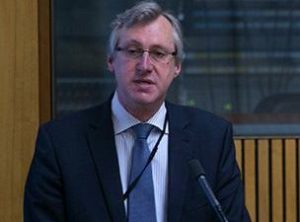Regional settlement of refugees a part of the global displacement solution
 Settling refugees and migrants in regional areas in Australia and across the world is gaining acceptance as part of a potential solution to the global displacement crisis which currently has seen 68 million people driven from their homes, a conference has heard.
Settling refugees and migrants in regional areas in Australia and across the world is gaining acceptance as part of a potential solution to the global displacement crisis which currently has seen 68 million people driven from their homes, a conference has heard.
The first ever Regional Settlement Conference held last week at Toowoomba, in Queensland, heard about several successful programs that have seen refugees settled in rural and regional locations.
United Nations High Commissioner for Refugees (UNHCR) Regional Representative for Australia and the Pacific Thomas Albrecht told the conference that regional settlement had exciting prospects.
“Increasingly we are recognising the potential regional settlement could have across the world,” Mr Albrecht said.
“The town of Nhill, in Victoria, is synonymous with the revitalisation and renewal refugees can bring to regional towns and that the benefits accepting refugees can bring go far beyond the economic,” he said.
At Nhill, a group Karen refugees were recruited to make up labour shortages for a local employer. The program to resettle the group has yielded benefits for the town in terms of economic and population renewal and for the Karen in terms of sustainable employment, housing and lifestyle.
“Studies show that fear of diverse groups is dramatically less after meeting just one person from a refugee background,” Mr Albrecht said.
He told the conference that Australia was one of just 35 countries that welcome refugees permanently under the UNHCR program.
But he said the number of resettlement opportunities has decreased over the past year.
“Currently there are 1.2 million people in urgent need of resettlement. The number of resettlement places reached a 20 year high of 120,000 in 2016. Since then that has reversed with just 75,000 this year,” Mr Albrecht said.
“So ninety per cent of those in need of resettlement will have no opportunity to do so. That’s 90 per cent of the most vulnerable people in the world.
“This means the UNHCR is facing the ever growing challenge of finding resettlement places for all who need them,” Mr Albrecht said.
Regional Australia Institute CEO Jack Archer told the conference regional settlement offered advantages for both migrants and refugees as well as struggling regional and rural communities.
“Migration is underpinning population growth in rural communities as well as the whole country and there is a case for investing more in building the architecture to support the regional settlement of migrants,” Mr Archer said.
He said regional Australia faced a number of challenges but also some opportunities.
“There is a decline in working age populations in rural areas in part because of a lack of educational opportunities and fewer people to take up those opportunities,” Mr Archer said.
“Rural Australia has high employment participation rates and low unemployment. But it also has an ageing population as Australian-born people move away.
“Job vacancies are 20 per cent higher in some rural areas and employment outcomes are better for migrants in rural areas.
“Stories like Nhill give me confidence that there is a case for regional settlement,” he said.
Mr Archer told the conference regional settlement could be expanded beyond the nine regional communities currently earmarked by the federal government for regional settlement.
“I think there could be a broader footprint. Places like Warrnambool, Kalgoorlie, Rockhampton and Bundaberg are ripe for resettlement programs,” he said.
“Most communities want to embrace migrant settlement as an incredible source of renewal for rural and regional communities,” Mr Archer said.
The conference also heard from researcher Sue Watt, who has surveyed attitudes on in the local community at Armidale, in NSW, toward the settlement of up to 300 refugees in the town after it was announced a new settlement area by the federal government.
Ms Watt said almost 70 of town residents were either “enthusiastic” or “positive” about the arrival of refugees.
“We surveyed 200 Armidale community members and overall attitudes about the refugees coming to the town were very positive,” Ms Watt said.
She said the “enthusiastic group were generally highly educated, idealistic and keen for cultural exchange and for the refugees to bring cultural diversity to the town.
Ms Watts said the minority who we “concerned” about the settlement were less positive.
“They think that the intake is too high and they expressed concern that there may not be enough jobs for the refugees,” she said.
Laurie Nowell
AMES Australia Senior Journalist












